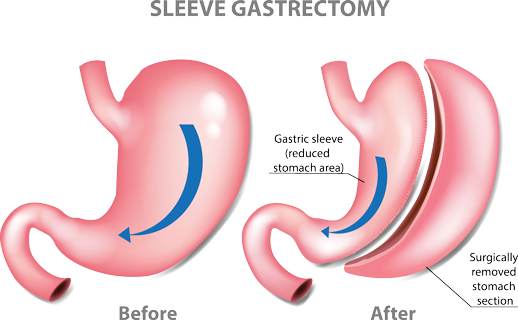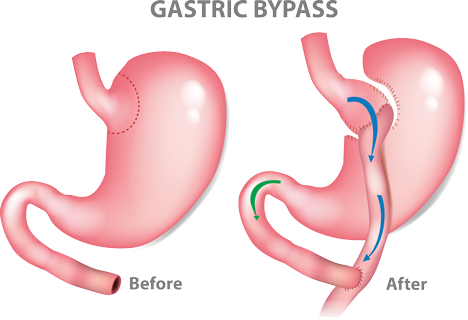Lose weight. Regain your health.
Why is it so hard to lose weight?
Like most features of a person’s physique, your weight is largely determined by genetics. Some people have bigger bodies than others, and once you reach a certain weight, your body will try hard to maintain that weight, and fight any attempts at weight loss. There are numerous hormonal mechanisms that try to keep your weight at a particular ‘set point’, and increase hunger in response to weight loss.
‘Diets’ and periods of weight loss also affect your body’s future response to food, with the body trying to conserve energy and return to the previous higher weight. As a result, with diet alone, achieving significant weight loss is very challenging, and maintaining that weight loss in the long term is an unrealistic goal for most people with obesity.
Weight loss surgery, or ‘Bariatric surgery’, addresses many of the hormonal mechanisms that drive hunger, and is clinically proven to achieve significant weight loss that can be maintained in the long term.
Is surgery for me?
The decision to go for surgery is an individual one, and requires a commitment to change your life for the better.
A thorough assessment of your individual circumstances can give you the right information to make a decision, and enable a full discussion of the potential benefits of surgery for you, the surgical options available, and the risks of surgery.
As part of your assessment you would meet the Surgeon, Mr Oliver Old. Mr Old is the clinical lead for Bariatric Surgery in Gloucestershire, and undertook specialist Fellowship training in Bariatric Surgery at international centres in Melbourne and Auckland. Mr Old is also a qualified Personal Trainer, and uniquely positioned to provide advice on the role of exercise to support healthy weight loss, in the context of weight loss surgery. The next step in the journey is a consultation with a dietitian, Jen Credicott, who specialises in weight loss, and supporting people through weight loss surgery. You can find out more about Jen. Jen continues to provide support for people undergoing weight loss surgery for 2 years after their procedure.
What are the surgical options?

Sleeve gastrectomy
This operation involves removal of most of the stomach, to leave a thin tube or ‘sleeve’ of stomach. It results in a stomach volume of about 50-150ml, and this means you feel full more quickly. It also removes part of the stomach (the fundus) that secretes a hormone called ghrelin, that makes you feel hungry. By removing this area, hunger is reduced.
Gastric bypass
This operation involves dividing the stomach to create a small pouch of stomach (nothing is removed), and then connecting the small intestine directly onto this small stomach pouch. Food passes into the pouch, and its small size contributes to feelings of fullness. Food is then delivered directly into the small intestine, bypassing the lower stomach, duodenum, and first part of the small intestine. This has a powerful effect on reducing appetite and improving a number of metabolic factors, such as diabetic control.

Mr Old discusses obesity and the types of bariatric surgery available in the videos below:
Obesity and the role of bariatric surgery
https://www.youtube.com/watch?v=5gw8tS5_aRU
Types of bariatric surgery procedures
https://www.youtube.com/watch?v=pvGQTfLiVfo
To learn more about bariatric surgery, the options available, and which option would be right for you, book a consultation at the link below.
